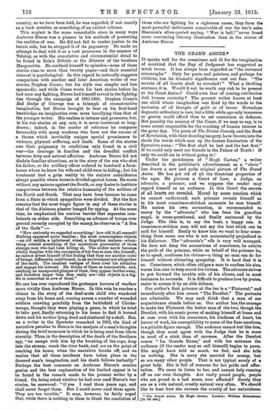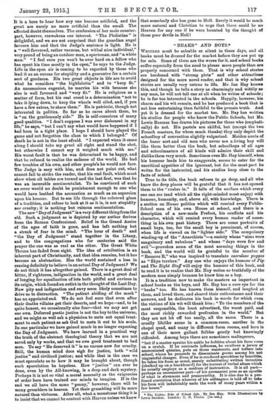THE GRAND ASSIZE.* IT speaks well for the conscience and
ill for the imagination of mankind that the Day of Judgment has suggested so much terror. It has always been regarded as "the universal catastrophe." Only for poets and painters, and perhaps for
children, has its dramatic significance cast out fear. The secrets of all hearts shall be revealed!" What a thrilling sentence it is. Would it not be worth any risk to be present at the Great Assize ? Could even fear of coming retribution dull human curiosity P The present writer knows at least one child whose imagination was fired by the words to the exclusion of all thought of guilt or of terror. Nowadays dogmatic orthodoxy is rare, but a little while ago only innocence or genius could afford thus to set conscience at defiance. But possibly the scenery of the Court, if we may so say, is to some extent responsible for the crushing of human interest in the great day. The poets of The Divine Comedy and the Book of Revelation, with their dazzling imagery, have thrown into the shade the words which sum up the human fascination of the figurative scene; "The first shall be last and the last first." If we could only meet our friends in the Palace of Truth! If only we could see in without going in!
Under the pseudonym of "Hugh Carton," a writer described in the publisher's advertisement as a "cleric" has drawn a new and quite original picture of The Grand Assize. He has got rid of all the theatrical properties of the ages. He pictures a Court of Law, a Judge, an advocate, a prisoner, and we suppose the reader may regard himself as an audience. In this Court the secrets of all hearts are revealed. Moved by some emotion which he cannot understand, each prisoner reveals himself as in his most conscience-stricken moments he sees himself. He makes his own accusation, is recommended to mercy by the "advocate," who has been his guardian angel, is cross-questioned, and finally sentenced by the Judge. The idea is, to say the least, a happy one. A conscience-stricken man will not say the best which can be said for himself. Really to know him we want to hear some- thing from some one who is not momentarily prejudiced in his disfavour. The " advocate's " rdZe is very well managed. He does not deny the accusations of conscience, he admits the guilt of the prisoner, while on behalf of the prisoner he, so to speak, confesses his virtues—a thing no man can do for himself without alienating sympathy. It is hard that it is so. Conscience, which often obliges a man to confess his sine, warns him also to keep secret his virtues. The advocate strives to put forward the lovable side of his clients, and in most instances he succeeds. It is difficult to produce love by praise, easier to arouse it by an able defence.
Our author's first prisoner at the bar is a "Plutocrat," and immediately after him comes " The Derelict." The portraits are admirable. We may each think that a man of our acquaintance stands before us. Our author has the courage to make the Plutocrat the better man of the two, though the Derelict, with his comic power of making himself at home and at ease even with his conscience, his kindness of heart, his horror of work, his susceptibility to some of the finer emotions, is a pitiable figure enough. The audience cannot but like him, though they must agree with the Judge that he is more in need of a stick than of caresses. After the Derelict comes " La Grande Dame," and with her entrance the audience (if the reader may so call himself) begins to yawn. She might have told us much, we feel, and she tells us nothing. She is sorry she married for money, but so are many other people. That is not typical surely of a great lady. She is full of remorse for her pride and affec- tation. We cease to listen to her, and cannot help running off on our own thoughts. Are really proud people, people who are proud in a bad sense, ever affected? Surely they are as a rule natural, cruelly natural very often. We should like to hear how she excuses the cruelty of her naturalness.
• The Grand dais& By Hugh Caress. London: William Heineman. [3s. ed. net.] It is a bore to bear how any one became artificial, and the great are surely no more artificial than the small. The affected doubt themselves. The confession of her male counter- part, however, reawakens our interest. "The Philistine" is delightful, and we are not surprised that the guardian angel favours him and that the Judge's sentence is light. He is a " well-favoured, rather vacuous, but withal nice individual," very proud of being an outdoor man, a sportsman, and " a white man." " I feel sure you won't be over bard on a fellow who has spent his time mostly in the open," he says to the Judge. Life in the open air is coming to be regarded by those who lead it as an excuse for stupidity and a guarantee for a certain sort of goodness. His two great objects in life are to avoid what be considers "the highfalutin" and to "keep fit," An unconscious eugenist, he marries his wife because she also is well favoured and "very fit." He is religious as a matter of form, but his real creed is a determination "not to take it lying down, to keep the wheels well oiled, and, if you have a few extras, to share them." He is patriotic, though not interested in politics. So far as he cares about them, he is "on the gentlemanly side." He is self-conscious of many good qualities. "I don't suppose I was ever dishonest in my life," he says, "but I can't say what would have happened if I lad been in a tight place. I hope I should have played the game and not forgotten the class to which I belonged." Of death he is not in the least afraid. "I expected when it came along I should take my gruel all right and stand the shot, but otherwise I cannot say it weighed much with me." His worst fault is that he was determined to be happy, and that he refused to realize the sadness of the world. He had few troubles of his own, and other people's he would not face. The Judge is easy with bin, and does not point out, what cannot fail to strike the reader, that his real fault, which must show when all tables are turned and the last first, was that he was an incurable sentimentalist. To be convinced of such an error would no doubt be punishment enough to one who would have loathed the accusation as much as an aspersion upon his honour. But to see life through the coloured glass of a tradition, and refuse to look et it as it is, is not stupidity nor cruelty; it is nothing but ruinous sentimentalism.
The new "Day of Judgment" is a very different thing from the old. Such a judgment as is depicted by our author derives from the Roman Confessional. Belief in the Grand Assize of the ages of faith is gone, and has left nothing hot a streak of fear in the mind. "The hour of death" and "the Day of Judgment" stand together in the Litany, and to the congregations who for centuries said the prayer the one was as real as the other. The Great White Throne has faded from sight. The idea of retribution is an inherent part of Christianity, and that idea remains, but it has become an abstraction. Has the world sustained a loss in ceasing definitely to believe in an actual Day of Judgment P We do not think it has altogether gained. There is a great deal of bitter, if righteous, indignation in the world, and a great deal of longing for equalization of lots both pitiful and envious in its origin, which found an outlet in the thought of the Last Day. Now pity and indignation and envy seem likely sometimes to drive us to distraction. " The patient abiding of the meek" has no appointed end. We do not feel sure that even after their deaths villains get their deserts, and we hope—and, to be quite honest, we occasionally also fear—that we may not get our own. Deferred poetic justice is not the key to the universe, and we might as well ask a physician to mete out equal treat. went to each patient as ask God to mete it out to his smile. In one particular we have gained much in no longer expecting the Day of Judgment. We have learned in a practical way the truth of the abstract theological theory that we are not saved only by works, and that we owe good treatment to bad men. To say " He deserved it" is no excuse now for cruelty. Still, the human mind does sigh for justice, both " wild justice" and civilized justice; and while that is the case we must speculate as to how it may be brought about, though such speculation be hopeless. How "justice" can ever be done, even by the All.knowing, is a deep and dark mystery. Perhaps it is not so vital a moral necessity as the exigencies of order here have trained our minds to imagine. If in the end we all have the same "penny." however, there will be many grumblers in heaven. Yet their grumbling will be more natural than virtuous. After all, what a monstrous thing it is to insist that we cannot be content with Heaven unless we know
that somebody else has gone to Hell. Surely it would be much more natural and Christian to urge that there could be no Heaven for any one if he were haunted by the thought of those poor devils in Hell!



































 Previous page
Previous page